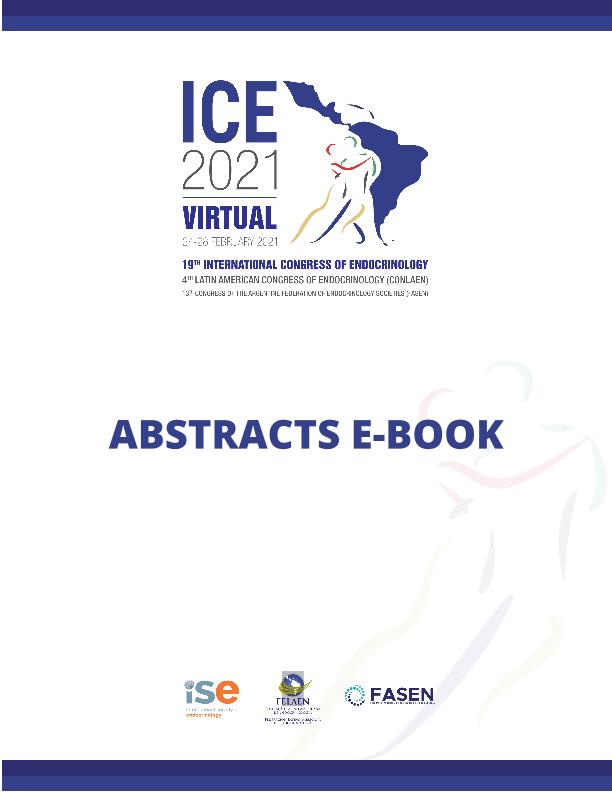Evento
Dehydroepiandrosterone supplementation improves cellular and biochemical markers of obesity
Tipo del evento:
Congreso
Nombre del evento:
19th International Congress of Endocrinology under the theme of “Global Partnership in Facing the Current Challenges in Endocrinology”
Fecha del evento:
24/02/2021
Institución Organizadora:
International Society of Endocrinology;
Título del Libro:
The ICE 2021 Abstracts E-Book
Editorial:
International Society of Endocrinology
Idioma:
Inglés
Clasificación temática:
Resumen
The obesity pandemic is a major worldwide health concern that predisposes to a higher risk of metabolic and cardiovascular diseases (CVD). In menopausal women the decline of ovarian steroidogenesis is associated to a high prevalence of CVD and obesity. Steroid hormones have a pivotal role in the regulation of angiogenesis. Vascularization of the adipose tissue modulates adipogenesis, lipids storage through a complex interplay not fully understood¬¬.According to intracrinology, DHEA can be converted into active sex steroids in peripheral tissues, avoiding their systemic exposure. DHEA supplementation is proposed as a low risk therapy for the prevention of postmenopausal diseases.The aim of this work was to study: a) the effect of DHEA administration on the metabolic profile and on oxidative stress markers related to obesity using using a murine model of obesity and hipoestrogenism; b) the role of DHEA on angiogenesis.Ovariectomized Wistar rats feed with standard diet (ND) (4%fat) or high fat (HF) diet (27%fat) received daily injections of vehicle (C) or DHEA (1mg/kg.day) for 8 weeks. Angiogenic effect of DHEA was evaluated in vitro using primary cultures of endothelial cells (EC) and ex vivo, using the rat aortic ring assay. Caloric intake was 22% higher in HF vs ND groups, with an increase of body weight and adiposity index. No significative differences were detected in glucose, cholesterol, HDL-cholesterol and triglycerides levels (table). In contrast, DHEA induced reduction in Cholesterol/HDL index in ND group, and of serum ROS (H2-DCFDA) both in NF and HF groups.Nitric oxide production ex vivo by rat aortic rings was enhanced by DHEA in both ND and HF (130% and 138% vs C, p<0.01), effect dependent on DHEA convertion to more active steroids since it was abolished in presence of a 3β-HSD inhibitor.The angiogenic process requires ECs proliferation, migration and organization. In ECs in vitro treatment with DHEA increased cell proliferation (130% above C p<0.01) and enhanced cell migration (15% above C p<0.05). Indeed, DHEA stimulated capillary tube formation when ECs were cultured in a fibrin matrix. Consistingly Ex vivo assays showed that DHEA (20 and 200nM) stimulated capillary tubes formation around aortic ring (8.5 vs 28.1, 29.2μm, C vs 20nM-200nM-DHEA p<0.05).These results suggest that DHEA supplementation to hipoestrogenic rats would improve metabolic and inflammatory markers associated with obesity, and also promotes neovascularization.
Palabras clave:
ANDROGENS
,
OBESITY
,
OXIDATIVE STRESS
,
ANGIOGENESIS
Archivos asociados
Licencia
Identificadores
Colecciones
Eventos(INBIOSUR)
Eventos de INSTITUTO DE CIENCIAS BIOLOGICAS Y BIOMEDICAS DEL SUR
Eventos de INSTITUTO DE CIENCIAS BIOLOGICAS Y BIOMEDICAS DEL SUR
Citación
Dehydroepiandrosterone supplementation improves cellular and biochemical markers of obesity; 19th International Congress of Endocrinology under the theme of “Global Partnership in Facing the Current Challenges in Endocrinology”; Buenos Aires; Argentina; 2021; 1-1
Compartir




